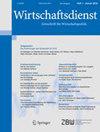转型期的人口变化
Q4 Business, Management and Accounting
引用次数: 0
摘要
德国联邦统计局的人口预测所依据的假设发生了变化,导致老年受扶养人比率适度上升。以前的预测预计预期寿命会有较大提高,从而导致人口老龄化。然而,持续增长的移民模式抵消了这一预测。人口变化中的双重老龄化过程现已转变为三重人口转变,其财政影响可能超出人口老龄化的范围。本文章由计算机程序翻译,如有差异,请以英文原文为准。
Der demografische Wandel im Wandel
The assumptions underlying the German Federal Statistical Office’s population projections have evolved, resulting in a moderate increase in the old-age dependency ratio. Previous scenarios anticipated larger gains in life expectancy, leading to demographic aging. However, consistently heightened migration patterns have counteracted the projections. The dual aging process in demographic change has now transformed into a triple demographic transformation, which may have fiscal implications beyond demographic aging.
求助全文
通过发布文献求助,成功后即可免费获取论文全文。
去求助
来源期刊

Wirtschaftsdienst
Business, Management and Accounting-Business, Management and Accounting (miscellaneous)
CiteScore
0.60
自引率
0.00%
发文量
228
审稿时长
8 weeks
期刊介绍:
Die Zeitschrift, herausgegeben von der ZBW, publiziert Beiträge von namhaften Autor:innen aus Wissenschaft und Politik zu aktuellen Themen der Wirtschafts- und Sozialpolitik in Deutschland und in der Europäischen Union.
Der Wirtschaftsdienst schlägt eine Brücke zwischen Wissenschaft und Praxis, die Leser:innen werden sachkundig und allgemeinverständlich über aktuelle wirtschaftspolitische Themen informiert.
Die Zeitschrift erscheint seit 1916 und gehört damit zu den traditionsreichsten wirtschaftswissenschaftlichen Fachzeitschriften.
Offiziell zitiert als: Wirtschaftsdienst
 求助内容:
求助内容: 应助结果提醒方式:
应助结果提醒方式:


